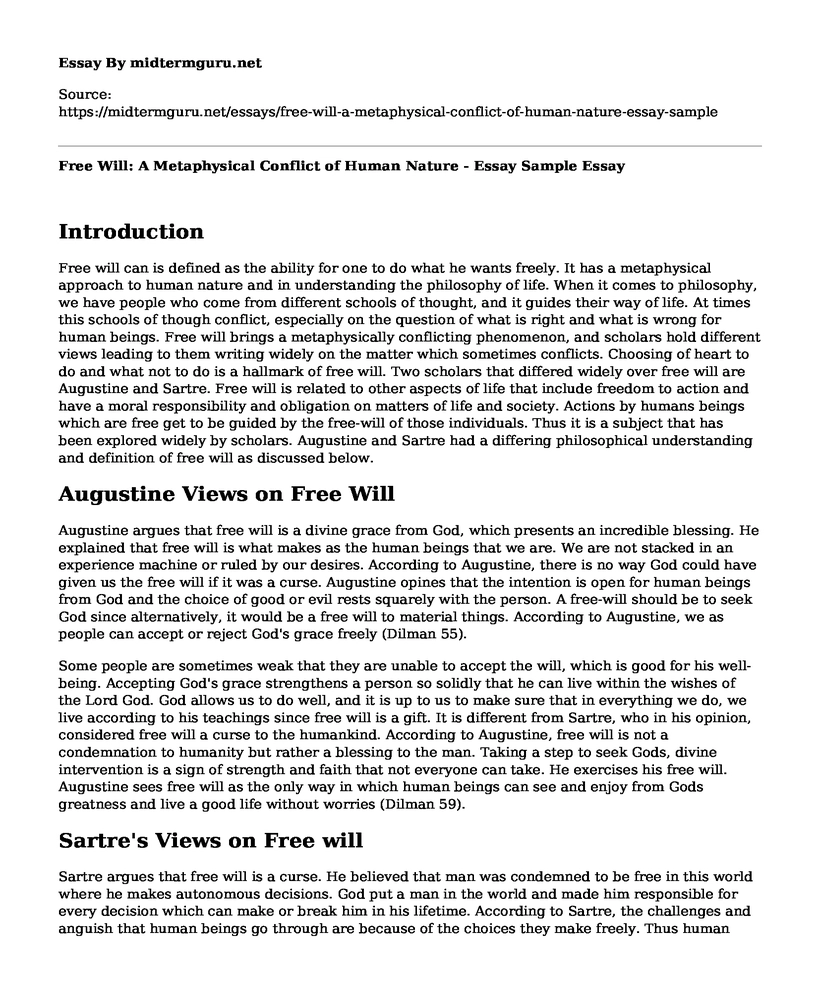Introduction
Free will can is defined as the ability for one to do what he wants freely. It has a metaphysical approach to human nature and in understanding the philosophy of life. When it comes to philosophy, we have people who come from different schools of thought, and it guides their way of life. At times this schools of though conflict, especially on the question of what is right and what is wrong for human beings. Free will brings a metaphysically conflicting phenomenon, and scholars hold different views leading to them writing widely on the matter which sometimes conflicts. Choosing of heart to do and what not to do is a hallmark of free will. Two scholars that differed widely over free will are Augustine and Sartre. Free will is related to other aspects of life that include freedom to action and have a moral responsibility and obligation on matters of life and society. Actions by humans beings which are free get to be guided by the free-will of those individuals. Thus it is a subject that has been explored widely by scholars. Augustine and Sartre had a differing philosophical understanding and definition of free will as discussed below.
Augustine Views on Free Will
Augustine argues that free will is a divine grace from God, which presents an incredible blessing. He explained that free will is what makes as the human beings that we are. We are not stacked in an experience machine or ruled by our desires. According to Augustine, there is no way God could have given us the free will if it was a curse. Augustine opines that the intention is open for human beings from God and the choice of good or evil rests squarely with the person. A free-will should be to seek God since alternatively, it would be a free will to material things. According to Augustine, we as people can accept or reject God's grace freely (Dilman 55).
Some people are sometimes weak that they are unable to accept the will, which is good for his well-being. Accepting God's grace strengthens a person so solidly that he can live within the wishes of the Lord God. God allows us to do well, and it is up to us to make sure that in everything we do, we live according to his teachings since free will is a gift. It is different from Sartre, who in his opinion, considered free will a curse to the humankind. According to Augustine, free will is not a condemnation to humanity but rather a blessing to the man. Taking a step to seek Gods, divine intervention is a sign of strength and faith that not everyone can take. He exercises his free will. Augustine sees free will as the only way in which human beings can see and enjoy from Gods greatness and live a good life without worries (Dilman 59).
Sartre's Views on Free will
Sartre argues that free will is a curse. He believed that man was condemned to be free in this world where he makes autonomous decisions. God put a man in the world and made him responsible for every decision which can make or break him in his lifetime. According to Sartre, the challenges and anguish that human beings go through are because of the choices they make freely. Thus human beings are condemned to be free (Dilman 73).
His arguments about free will focus on the theory of existentialism. This point of view puts it that existence comes before essence. Human beings define what is right or wrong in the world. It is the highest level of free will. The decision on free will sometimes have the potential of hurting the individual. The argument by Sartre that free will was a curse and not a blessing. The lack of a predefined purpose and action that made Sartre call free will as the freedom anguish caused by the free-will philosophy (Dilman 62).
In my view, Augustine was right is his philosophical view of free will. When two deeply held beliefs come into conflict, then the issues of free arises. Sartre argument that free-will proponents assume that human beings can only make bad decisions is wrong. It does not represent the true nature of spiritual human beings. Free will is a blessing to human-kind and cannot in any way be a curse as argued by Sartre (Dilman, 77).
Conclusion
Augustine and Sartre argued whether one could take action freely and not influenced by other conditions in the society that determine the course of life. The scholar's conflict on whether measures are taken in free-will by human beings, or they get defined by other factors that are beyond an individual. When human beings choose to act in specific ways, they feel like they are making that decision freely, but it is not a free will after all. Other factors influence the choice.
Work Cited
Dilman, Ilham. Free will: An historical and philosophical introduction. Routledge (2013):55-100.
Cite this page
Free Will: A Metaphysical Conflict of Human Nature - Essay Sample. (2023, Jan 31). Retrieved from https://midtermguru.com/essays/free-will-a-metaphysical-conflict-of-human-nature-essay-sample
If you are the original author of this essay and no longer wish to have it published on the midtermguru.com website, please click below to request its removal:
- Paper Example on Psychoeducational Framework for Depressed Adolescents
- Research Paper on Bipolar Disorder Symptoms and Treatments
- Teaching Men to Be Emotionally Honest - Research Paper
- Paper Example on Self-Assessment for Leadership
- Sociopathy: Challenges of Living With an Antisocial Personality Disorder - Essay Sample
- Personality Development: Foundations, Features, and Influences - Essay Sample
- The Rise of Unethical Behaviors: Practical Ethics and Ethical Ramifications - Essay Sample







